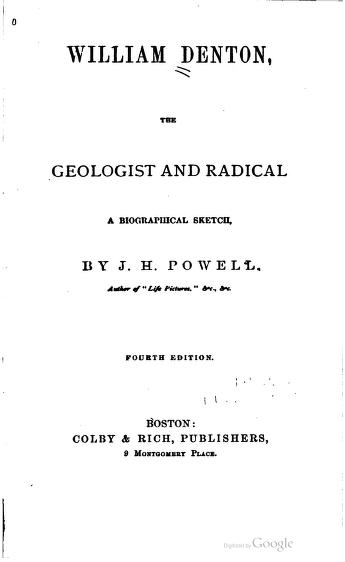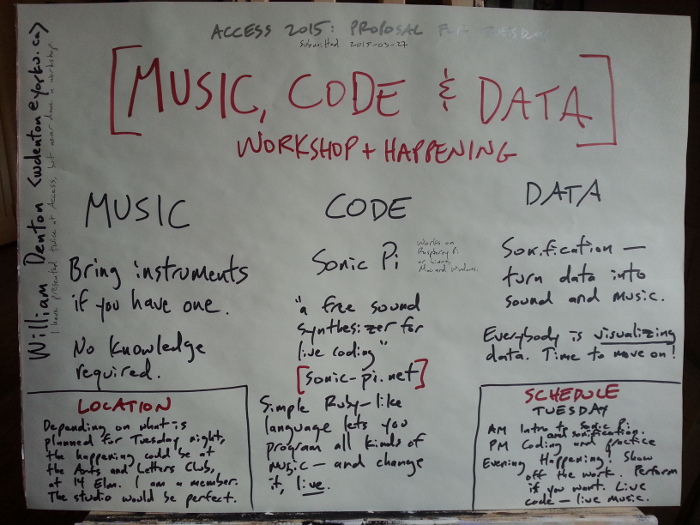Geologist and Radical
He knew the past, which is sometimes much worse
I’m rereading the Three Musketeers saga by Alexandre Dumas—one of the greatest of all works of literature—and just re-met a quote I wrote down when I first read it. It’s from chapter twenty-seven of Twenty Years After (Vingt ans après), and is about Urbain Grandier, but I’ll leave out his name to strengthen it:
“[He] was not a sorceror, but a learned man, which is quite another thing. He did not foretell the future. He knew the past, which is sometimes much worse.”
In the original, it reads:
“[Il] n'était pas un sorcier, c'était un savant, ce qui est tout autre chose. [Il] ne prédisait pas l'avenir. Il savait le passé, ce qui quelquefois est bien pis.”
Thinks and Burns
Yesterday I stumbled on the Thinks and Burns with Fink and Byrne podcast. I have no idea where or when (indeed if) it was announced, but I was happy to find it. It’s John Fink (@adr) and Gillian Byrne (@redgirl13) talking about library matters. I’m acquainted with both of them and we all work near each other, so it’s of more interest to me than if it were two complete strangers rambling on, but if you know either of them, or are a Canadian librarian, or like podcasts where two librarians talk like you’re hanging out down the pub and one keeps hitting the table for emphasis, it’s worth a listen. They’ve done three episodes, and I hope they keep it going, even if irregularly.
Now with schema.org and COinS structured metadata
Thanks to a combination of Access excitement, a talk by Dan Scott, a talk by Mita Williams, and wanting to learn more, I added schema.org and COinS metadata to this site. It validates, though I’m not sure if the semantic structure is correct. Here’s what I’ve got so far.
My Jekyll setup
I build this site with Jekyll. It uses static HTML templates in which you can place content as needed or do a little bit of simple scripting (inside double braces, which here I’ve spaced out: { { something } }). My main template is _layouts/miskatonic.html, which (leaving out the side, the footer, CSS and much else) looks like this:
<!DOCTYPE html>
<html itemscope itemtype="http://schema.org/CreativeWork">
<head>
<meta charset="utf-8">
<meta name="referrer" content="origin-when-cross-origin" />
<title>{ {page.title} } | { { site.name } }</title>
<meta itemprop="creator" content="William Denton">
<meta itemprop="name" content="Miskatonic University Press">
<link rel="icon" type="image/x-icon" href="/images/favicon.ico">
<link rel="alternate" type="application/rss+xml" title="Miskatonic University Press RSS" href="https://www.miskatonic.org/feed/all.xml" />
</head>
<body>
<article>
{ { content } }
</article>
<aside></aside>
</body>
</html>It declares that the web site is a CreativeWork, what its name is, and who owns it.
I have two types of pages: posts and pages. Posts are blog posts like this, and pages are things like Fictional Footnotes and Indexes.
My page template, _layouts/page.html, sets out that the page is, in the schema.org sense, an Article:
---
layout: miskatonic
---
<div itemscope itemtype="https://schema.org/Article">
{ % include coins.html % }
<meta itemprop="creator" content="William Denton">
<meta itemprop="license" content="https://creativecommons.org/licenses/by-sa/4.0/">
<meta itemprop="name" content="{ { page.title } }">
<meta itemprop="headline" content="{ { page.title } }">
{ % if page.description % }
<meta itemprop="description" content="{ { page.description } }">
{ % endif % }
<img itemprop="image" src="/images/dentograph-400px-400px.png" alt="" style="display: none;">
<h1>{ { page.title } }</h1>
<p>
<time itemprop="datePublished" datetime="{ { page.date | date_to_xmlschema } }">
{ { page.date | date_to_long_string } }
</time>
<span class="tags">
{ % for tag in page.tags % }
<a href="/posts/tags.html#{ { tag } }"><span itemprop="keywords">{ { tag } }</span></a>
{ % endfor % }
</span>
</p>
<div class="post" itemprop="articleBody">
{ { content } }
</div>
</div>Those meta tags declare some properties of the Article. Every Article is required to have a headline and an image, which doesn’t really suit my needs and shows the commercial nature of the system. For the headline, I just use the title of the page. For the image, I use a generic image that will repeat on every page, and what’s more I style it with CSS so it’s not visible. I may come back to this later and make it work better.
The layout: miskatonic at the top means that this content gets inserted into that layout where the { { content } } line is.
The _layouts/post.html template looks like this:
---
layout: miskatonic
---
<div itemscope itemtype="https://schema.org/BlogPosting">
{ % include coins.html % }
<meta itemprop="creator" content="William Denton">
<meta itemprop="license" content="https://creativecommons.org/licenses/by-sa/4.0/">
<h1 itemprop="name">{ { page.title } }</h1>
<p>
<time itemprop="datePublished" datetime="{ { page.date | date_to_xmlschema } }">
{ { page.date | date_to_long_string } }
</time>
<span class="tags">
{ % for tag in page.tags % }
<a href="/posts/tags.html#{ { tag } }"><span itemprop="keywords">{ { tag } }</span></a>
{ % endfor % }
</span>
</p>
<div class="post" itemprop="articleBody">
{ { content } }
</div>
</div>Every blog post is a BlogPosting. The same kind of properties are given about it as for a page, and the same image trick. I usually include images with blog posts and maybe there’s a simple way to make Jekyll find the first one and bung it in there. I don’t think I want to get into listing all the images I use in the YAML header … that’s too much work.
When I write a blog post, like this one, I start it with
---
layout: post
title: Now with schema.org and COinS structured metadata
tags: jekyll metadata
date: 2015-09-11 16:24:17 -0400
---
That defines that this is a post, so the Markdown is processed and inserted into the post layout, which is processed and put into the miskatonic layout, which is processed, and that’s turned into static HTML and dumped to disk. (Or something along those lines.)
Proper semantics?
This all validates, but I’m not sure if the semantics are correct. Google’s Structured Data Testing Tool says this about a recent blog post:
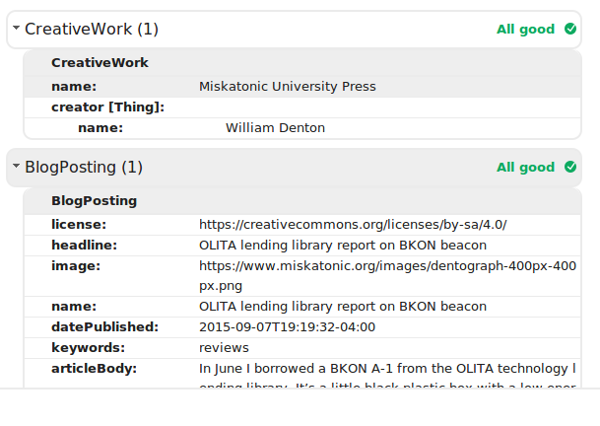
CreativeWork (my site) and the BlogPosting (the post) are at the same level. I’m not sure if the BlogPosting should be a child of the Creative Work. It is in the schema.org schema, but I don’t know if that should apply to this structure here.
Useful links
- Adding schema.org metadata to Jekyll
- Integrate the schema.org microformat with Jekyll
- Enabling rich snippets in articles
Validators:
- Google’s Structured Data Testing Tool
- Structured Data Linter
- W3C’s Nu HTML Checker
COinS
While I was at all this, I decided to add COinS metadata to everything so Zotero could make sense of it. Adapting Matthew Lincoln’s COinS for your Jekyll blog, I created _includes/coins.html, which looks like this, though if you want to use it, reformat it to remove all the newlines and spaced braces, and change the name:
<span class="Z3988" title="ctx_ver=Z39.88-2004&rft_val_fmt=info%3Aofi%2Ffmt%3Akev%3Amtx%3Adc
&rft.title={ { page.title | cgi_escape } }
&rft.aulast=Denton&rft.aufirst=William
&rft.source={ { site.name | cgi_escape } }
&rft.date={ { page.date | date_to_xmlschema } }
&rft.type=blogPost&rft.format=text
&rft.identifier={ { site.url | cgi_escape } }{ { page.url | cgi_escape } }
&rft.language=English"></span>
I just noticed that this says the thing is a blog post, and I’m using this COinS snippet on both my pages and posts, so Zotero thinks the pages are posts, but I’ll let that ride for now. Zotero users, if you ever cite one of my pages, watch out.
COinS is over ten years old now! There must be a more modern way to do this. Or is there?
Bibliographic information in schema.org
Now that I’ve done this, search engines like Google can make better sense of the content of the site, which is nice enough, though I hardly ever use Google (I’m a DuckDuckGo man—it’s not as good, but it’s better). I would like to mark up my talks and publications so all of that citation information is machine-readable, but bib.schema.org hasn’t been formally approved yet, from what I can see. And look at all of the markup going on for something like a Chapter!
Blecch. I don’t want to type all that kind of cruft every time I want to describe a chapter or article. There are things like jekyll-scholar that would let me turn a set of BibTeX citations into HTML, but it doesn’t do microformats. Maybe that would something to hack on. Or maybe I’ll just leave it all for now and come back to it next time I feel like doing some fiddling with this site. That’s enough template hacking for one week!
Corrections welcome
If anyone who happens to read this sees any errors in what I’ve done, please let me know. I don’t really care if my headlines could be better, but if there’s something semantically wrong with what I’ve described here, I’d like to get it right.
OLITA lending library report on BKON beacon
In June I borrowed a BKON A-1 from the OLITA technology lending library. It’s a little black plastic box with a low energy Bluetooth transmitter inside, and you can configure it to broadcast a URL that can be detected by smartphones. I was curious to see what it was like, though I have no use case for it. If you borrow something from the library you’re supposed to write it up, so here’s my brief review.
- I took it out of its box and put two batteries in.
- I installed a beacon detector on my phone and scanned for it.
- I saw it:
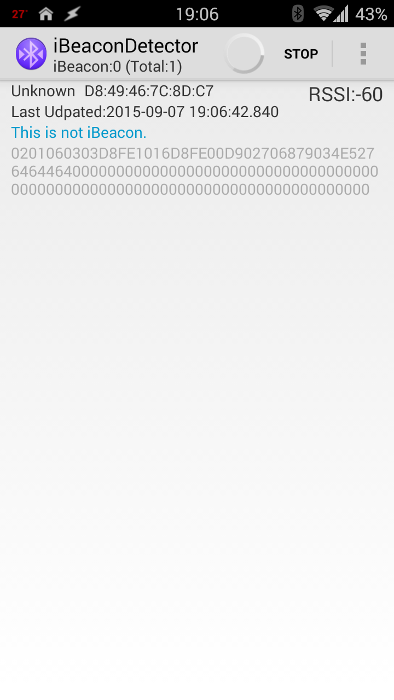
- I followed the instructions on the BKON Quick Start Guide.
- I set up an account.
- I couldn’t log in. I tried two browsers but for whatever unknown reason it just wouldn’t work.
- I took out the two batteries and put it back in its box.
I’ll give it back to Dan Scott, who said he’s going to ship it back to the manufacturer so they can install the new firmware. I wish better luck to the next borrower.
A Catalogue of Cuts
I wrote a short piece for the newsletter of the York University Faculty Association: York University Libraries: A Catalogue of Cuts. We’ve had year after year of budget cuts at York and York University Libraries, but we in the library we don’t talk about them in public much. We should.
(Librarians at York University are members of YUFA and have academic status. I am in the final year of my second term as a steward for the Libraries chapter of YUFA. Patti Ryan is my fellow steward.)
Access testimonial
I submitted a testimonial about the annual Access conference about libraries and technology:
The first time I went to Access was 2006 in Ottawa. I was one year out of library school. I was unemployed. I paid my own way. I didn’t want to miss it. Everyone I admired in the library technology world was going to be there. They were excited about it, and said how much they loved the conference every year. When I got there, the first morning, I thought, “These are my people.” I left admiring a lot of new acquaintances. Every year I go, I feel the same way and the same thing happens.
All true, every word. (That conference was where Dan Chudnov and I chatted over a glass of wine, which made it all the better.)
Here’s more reason why I like Access: the 2015 conference is in Toronto next week, and I’m running a hackfest about turning data into music. This is what my proposal looked like:
I emailed them a JPEG. They accepted the proposal. That’s my kind of conference.
I also have to mention the talk Adam Taves and I did in Winnipeg at Access 2010: After Launching Search and Discovery, Who Is Mission Control?. “A Tragicomedy in 8 or 9 Acts.” It’s a rare conference where you can mix systems librarianship with performance art.
But of all the write-ups I’ve done of anything Access-related, I think 2009’s DIG: Hackfest, done about Cory Doctorow when I was channelling James Ellroy, is the best:
Signs: “Hackfest.” We follow. People point. We get to the room. There are people there. They have laptops. They sit. They mill around. They stand. They talk. “Haven’t seen you since last year. How’ve you been?”
Vibe: GEEK.
Cory Doctorow giving a talk. No talks at Hackfest before. People uncertain. What’s going on? Cory sitting in chair. Cory working on laptop. Cory gets up. Paper with notes scribbled on it. He talks about copyright. He talks about freedom. He talks about how copyright law could affect US.
He vibes geek. He vibes cool.
MIME type
Screenshot of an email notification I received from Bell, as viewed in Alpine:
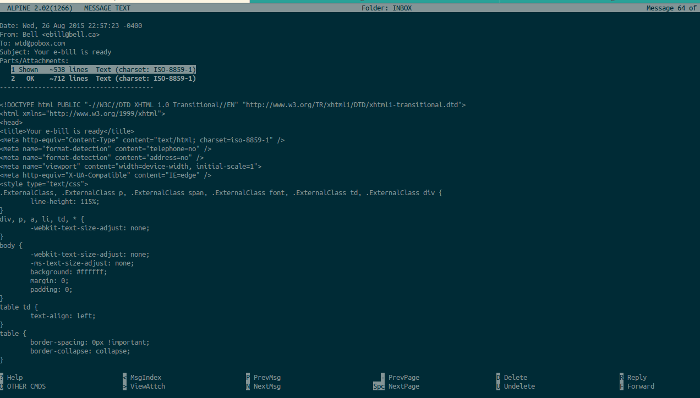
Inside: Content-Type: text/plain; charset="ISO-8859-1"
In the future, email billing will be mandatory and email bills will be unreadable.
 Miskatonic University Press
Miskatonic University Press